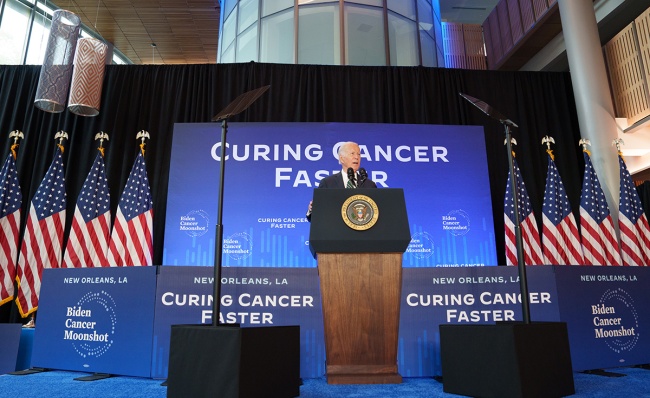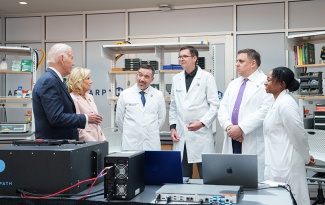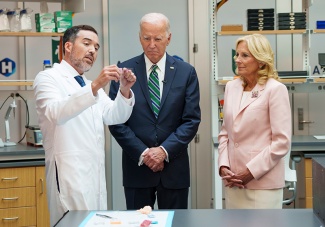(Photo by Kenny Lass)
President Joseph R. Biden Jr. and First Lady Jill Biden visited Tulane University in mid-August to celebrate a project that promises to bring a new kind of magic to the world of cancer treatment — a groundbreaking initiative that could save lives by dramatically enhancing the ability of surgeons to remove cancer from the body.
Tulane President Michael A. Fitts introduced the Bidens as “relentless champions in the battle to end cancer.”
“You have inspired and empowered the research community to take risks that can produce transformative changes in cancer research and care,” Fitts said.
He joined the Bidens and Quincy Brown, Tulane associate professor of biomedical engineering and leader of MAGIC-SCAN, to announce a new Tulane project that aims to create a machine-learning-assisted imaging system capable of identifying even the tiniest remnant of cancer during surgery. The project is one of eight included in a $150 million funding initiative announced to develop novel technologies that will allow surgeons to remove cancerous tumors with higher accuracy. If successful, these technologies will revolutionize surgeries, dramatically reducing rates of repeat procedures.
Tulane’s portion of the Biden Cancer Moonshot project will be funded with an award of up to $22.9 million from the bipartisan Advanced Research Projects Agency for Health, also known as ARPA-H, a federal funding agency established by the Biden Administration in 2022 to rapidly advance high-potential, high-impact biomedical research.
Biden, whose son Beau died of brain cancer in 2015, announced the award at a ceremony in the Marshall Family Commons, an expansive atrium on the ground floor the Goldring-Woldenberg Business Complex on Tulane’s uptown campus. A sign emblazoned with the words “Curing Cancer Faster” served as a backdrop along with eight American flags.
“We believe anything is possible in America,” said Biden, whose daughter Ashley graduated from Tulane. “Anything we set our minds to is possible. We are the land of possibilities. That’s who we are. And that’s what you’re doing here at Tulane.”

































































